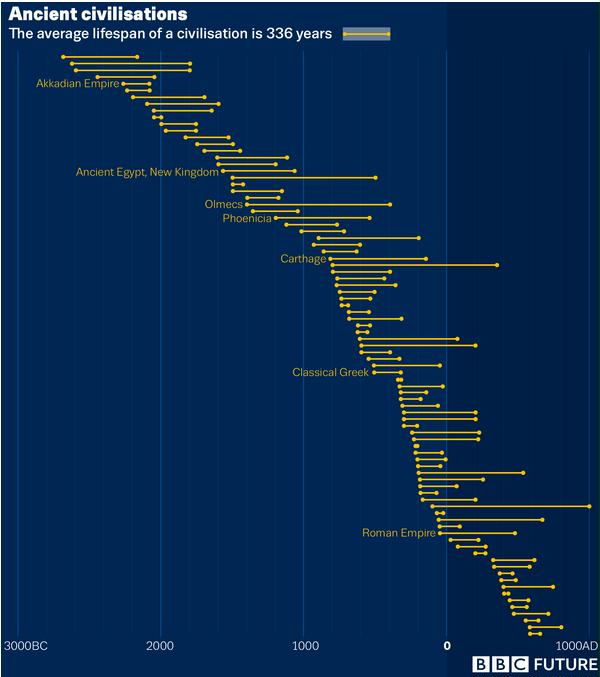Preface. I stopped trying to find out why each civilization failed because it’s not always clear and historians bicker over it, so I was glad to run across this article that attempts to summarize this broad topic.
It’s clear drought, invasions, civil wars, and famines played a role in most of them. Yet what’s seldom mentioned are biophysical factors such as deforestation (Perlin “A forest journey”) and topsoil erosion (Montgomery “Dirt: the erosion of civilization”) which were often the main reasons for collapse.
But what’s clear is that societies collapse eventually (the Roman Empire for 210 reasons according to one historian) and our civilization will fail as well, since it depends on a one-time only supply of fossil fuels. I suspect faster than any civilizations in the past, and this time globally.
Alice Friedemann www.energyskeptic.com Author of Life After Fossil Fuels: A Reality Check on Alternative Energy; When Trucks Stop Running: Energy and the Future of Transportation”, Barriers to Making Algal Biofuels, & “Crunch! Whole Grain Artisan Chips and Crackers”. Women in ecology Podcasts: WGBH, Jore, Planet: Critical, Crazy Town, Collapse Chronicles, Derrick Jensen, Practical Prepping, Kunstler 253 &278, Peak Prosperity, Index of best energyskeptic posts
***
Kemp, L. 2019. Are we on the road to civilization collapse? Studying the demise of historic civilizations can tell us how much risk we face today says collapse expert Luke Kemp. Worryingly, the signs are worsening. BBC
The chart below shows the lifespan of civilizations with agriculture, multiple cities, military dominance in its geographical region and a continuous political structure. Given this definition, all empires are civilizations, but not all civilizations are empires.

Civilization [Duration in years]
- Ancient Egypt, Old Kingdom [505] The power of pharaoh gradually weakened in favor of powerful nomarchs (regional governors)…. The country slipped into civil wars mere decades after the close of Pepi II’s reign. The final blow was the 22nd century BC drought in the region that resulted in a drastic drop in precipitation. For at least some years between 2200 and 2150 BC, this prevented the normal flooding of the Nile. The collapse of the Old Kingdom was followed by decades of famine and strife.
- Ancient Egypt, Middle Kingdom [405]
- Ancient Egypt, New Kingdom [501] Egypt was increasingly beset by droughts, below-normal flooding of the Nile, famine, civil unrest and official corruption
- Norte Chico Civilisation [827] when this civilization is in decline, we begin to find extensive canals farther north. People were moving to more fertile ground and taking their knowledge of irrigation with them
- Harappan Civilisation (Indus Valley Civilisation) [800] Aridification of this region during the 3rd millennium BCE eventually also reduced the water supply enough to cause the civilisation’s demise, and to scatter its population eastward
- Kerma [400] Egypt grew increasingly powerful and envious of Kerma’s resources. They launched a series of military campaigns that destroyed Kerma
- Akkadian Empire [187] The empire of Akkad fell, perhaps in the 22nd century BC, within 180 years of its founding, ushering in a “Dark Age” collapsing outright from the invasion of barbarian peoples from the Zagros Mountains known as the Gutians. Another theory is a century of drought.
- Elam Civilisation (Awan Dynasty) [157] The Assyrians had utterly destroyed the Elamite nation
- Minoan Civilisation (Protopalatial) [500] Volcanic explosion
- Xia Dynasty [500]
- Third Dynasty of Ur [46]
- Old Assyrian Empire [241]
- Middle Assyrian Empire [313]
- Neo Assyrian Empire [322]
- Elam Civilisation (Eparti Dynasty) [210]
- First Babylonian Dynasty [299]
- Old Hittie Empire [250]
- Minoan Civilisation (Neopalatial) [250]
- Shang Dynasty [478]
- Mycenae [400]
- Vedic Civilisation [1000]
- Middle Hittite Kingdom [70]
- Elam Civilisation (Middle Elamite Period) [342]
- New Hittite Kingdom [220]
- Olmecs [1000]
- Phoenicia [661]
- Zhou Dynasty (Western Period) [351]
- Kingdom of Israel and Judah [298]
- Chavin Culture [700]
- Urartu [225]
- Kushite Kingdom [1150]
- Etruscans [404]
- Zhou Dynasty (Eastern Zhou Spring Period) [330]
- Zhou Dynasty (Eastern Zhou Warring States Period) [411]
- Ancient Rome [244]
- Elam Civilisation (Neo-Elamite Period) [203]
- Phrygia [43]
- Lydia [144]
- Magadha Empire [364]
- Chaldean Dynasty (Babylon) [87]
- Medean Empire [66]
- Orontid Dynasty [540]
- Scythians [800]
- Mahanjanapadas [200]
- Carthage [667]
- Achaemenid Empire [220]
- Roman Republic [461]
- Nanda Empire [24]
- Ptolemaic Egypt [302]
- Classical Greek [265]
- Hellenistic [177]
- Maurya Empire [137]
- Seleucid Empire [249]
- First Chera Empire [500]
- Early Chola Empire [500]
- Maghada-Maurya [90]
- Parthian Empire [469]
- Satavahana Dynasty [450]
- Qin Dynasty [14]
- Xiongnu Empire [184]
- Han Dynasty (Western Period) [197]
- Numidia [156]
- Teotihuacans [735]
- Kingdom of Armenia [442]
- Hsiung Nu Han [120]
- Sunga Empire [112]
- Andhra [370]
- Aksumite Empire [1100]
- Kanva Dynasty [45]
- Three Kingdoms of Korea [725]
- Saka [140]
- Roman Empire [525]
- Han Dynasty (Eastern Period) [195]
- Kushan [200]
- Bactria [70]
- Ptolemaic [290]
- Liu-Sung [250]
- Gupta [90]
- Hun [100]
- Byzantine [350]
- Yuen-Yuen [30]
- Toba [130]
- White Hun [100]
- Visigoth [240]
- T’u Chueh Turk [90]
- Avar [220]
- Western Turk [70]

4 Responses to Civilizations last just 336 years on average